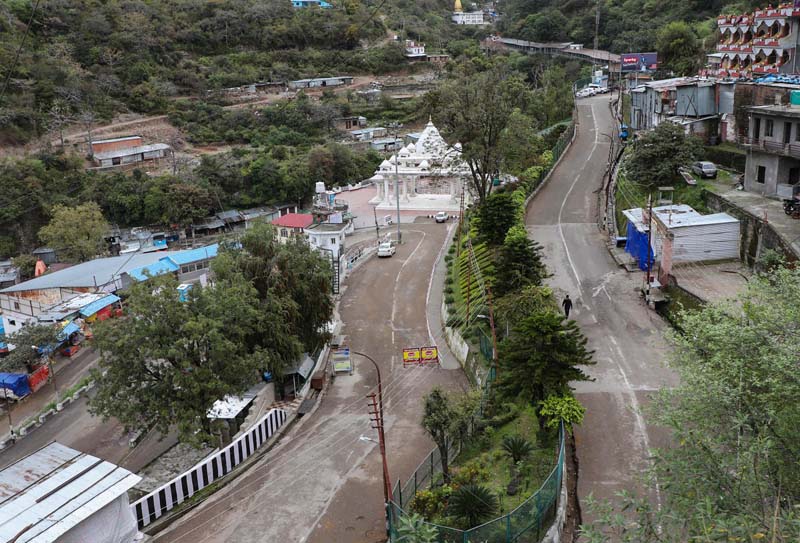Sanjeev K. Sharma
JAMMU, July 27: It might not be an exaggeration if we term ‘livelihoods from God’ to the incomes derived directly or indirectly from the religious and pilgrimage places and it has come to fore that all such incomes are constantly staying at zero since the last about four months of the ongoing lockdown restriction triggered by the deadly COVID-19 pandemic with many of the affected people finding it extremely tough to make both ends meet.
Reliable sources informed that right from an hotelier to a Prasad vendor at temples and pilgrimage places, everyone having business linked to religious places or pilgrimages has been badly hit as all these places have been closed and pilgrimages stopped by the authorities in order to contain the deadly Corona infection.
Sources informed that hoteliers in Katra are the top sufferers of this closure with many finding it hard to meet the maintenance expenses of their infrastructures.
“Business in Katra town is 100 per cent dependent on Shri Mata Vaishno Devi Ji pilgrimage,” Sanjeev Sharma, who sells Bhaints, Prasad, Mata Ki Chunri, dry fruit and other such items in his shop at Katra told this journalist.
“We have good daily sales during normalcy due to the blessings of Mata Rani (Goddess) and our sales even augmented in days of holy Navratras and also in the months of May and June due to increased pilgrimage,” he informed adding that for the last about four months their business is staying at zero due to the closure of the cave shrine as the pilgrimage has been stopped by the authorities.
However, many more shopkeepers informed that apart from their sales remaining nil, they also face losses worth several lakhs of rupees as the dry fruits and other perishable items at their shops are facing a rot due to the closure for a long time.
“Even a small shop in Katra has dry fruit worth Rs 2-3 lakhs,” they maintained.
Similarly the Ponywalas and Palkiwalas working for Mata Vaishno Devi pilgrimage and auto-rickshaw drivers who carry devotees from Katra Bus Stand to Darshani Deodi (main entrance from where walkway of the pilgrimage starts) and others at Katra are also having a tough time these days and are facing the tough challenge of survival.
“I have two horses and for the last four months I am finding it very hard to manage even fodder for my animals who constitute the only source of my income on which my entire family depends,” Shokat Ali, who carries pilgrims on his horse to the cave shrine of Mata Vaishno Devi said.
He further said that earlier, on normal days he had such an earning that after meeting all the expenses of horses and his family he used to save at least Rs. 500 daily.
Meanwhile, Joginder Kumar, a Prasad vendor at Kol Kandoli temple in Nagrota on the outskirts of Jammu city, remained another victim hit by the closure of the temple due to Coronavirus pandemic.
“Closure of the temple has closed my source of income. I have a family of five members to support and presently I am experiencing tough days as all my savings have been exhausted and now I am borrowing money from friends and relatives to run daily family expenses,” he said.
Owners of other 12 kiosks at the temple too have a similar tale to tell.
It is pertinent to mention here that the shrine of Kol Kandoli Mata in Nagrota forms the first Darshan to the pilgrimage of Mata Vaishno Devi Ji.
Similar is the fate of those whose business is linked to the renowned temple of Bawe Wali Mata on the bank of river Tawi in Jammu.
“We had good daily earnings which even increased manifolds on Sundays and Tuesdays,” said Ankush Khajuria, who sells flowers, Prasad and other items which devotees offer to the Goddess Kali at the shrine enclosed in the historic Bahu Fort.
He also informed that there are 125 shops in the market with many having employed some men, all of them now jobless as the very owners of the shops are having no income since the temple has been closed.
Locals of the area informed that apart from this there were some 24-25 Reharis selling eatables to the devotees who were not seen from the day lockdown was clamped and the temple was closed.
Similar is the fate of the vendors selling Prasad and other such items at Peer Babas and Mosques across J&K.
When contacted Gujjar leader, Sobat Ali, who is very familiar with the issues of Muslim religious places, said that Prasad vendors at Peer Babas of Kunjwani, Tawi Bridge, Satwari etc and many vendors selling Islamic caps, rosaries etc at prominent Mosques in Jammu are poor persons who are now suffering badly as they have no income at present due to the closure of these places of offering prayers.


